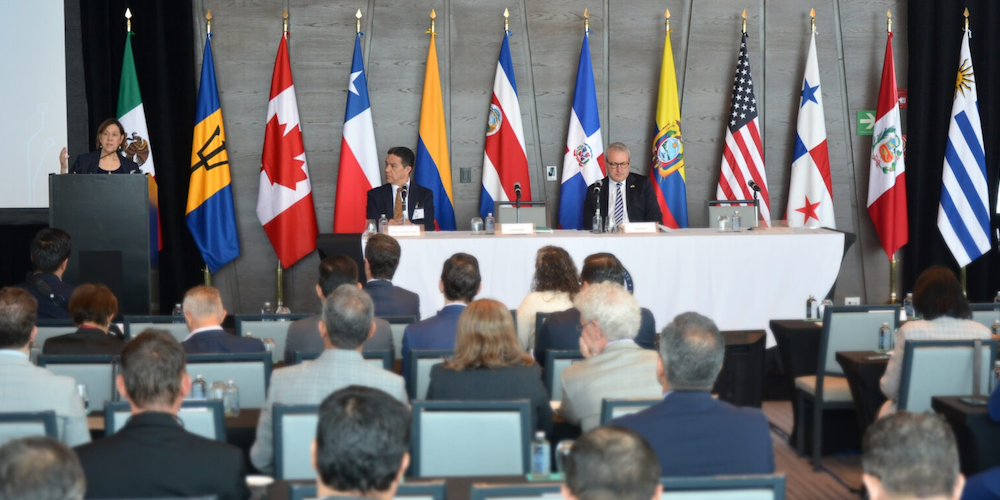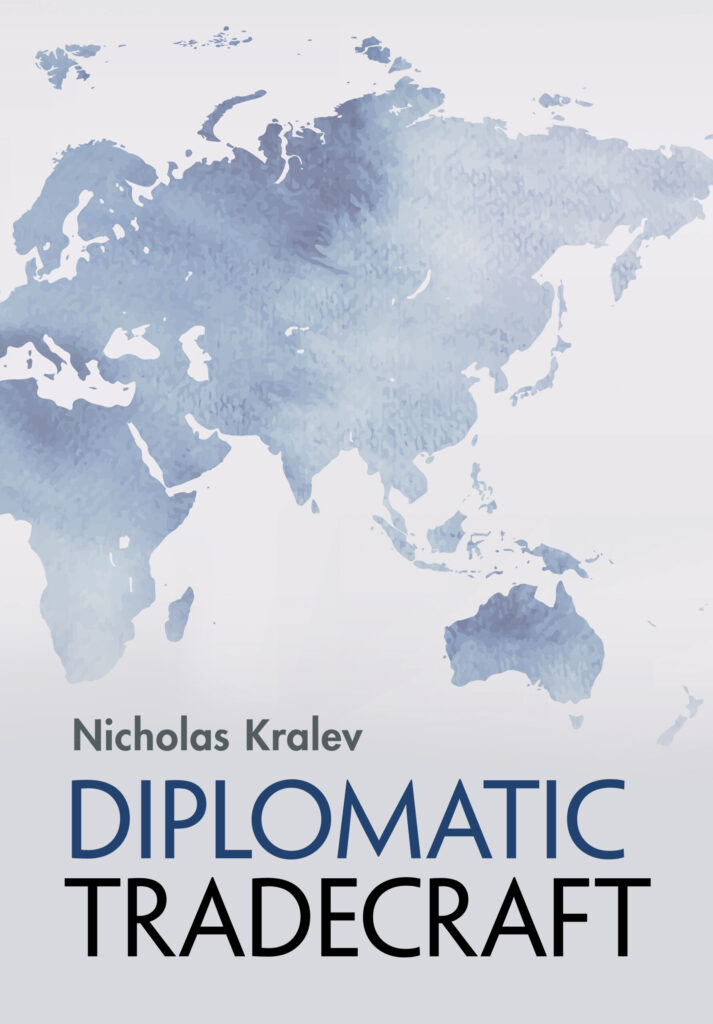Lifting the Curtain on Economic and Commercial Diplomacy
The set of duties, responsibilities and skills required of diplomats working in economic affairs is known as economic tradecraft.

Mary Ng likes to talk about a “trilateral hamburger.” In it, the beef comes from Canadian cows but is processed in the United States. The buns are made from Canadian wheat but are baked in Mexico. The lettuce is American and the tomatoes Mexican. “This is how connected our economies are” on the most basic level, Ng, Canada’s minister of international trade, said at a 2021 event to mark the first anniversary of a trade agreement negotiated among the three countries.
Thanks to the unprecedented level of integration in the world economy, much of what we own comes from different parts of the world. A shirt may be designed in Italy, manufactured in Vietnam from Indian fabric and sold in Britain. A German-made car may be assembled in China. On a much larger scale, the Boeing 787 aircraft has parts from at least eight countries, including engines from the United States, center fuselage from Italy, landing gear from France, access doors from Sweden, cabin lights from Germany and lavatory parts from Japan. Such complex and truly global integration does not just happen — to a large extent, it is the result of diplomacy. We take for granted the ability to travel seamlessly to, through and over other countries, but it would not be possible without diplomacy.
When unexpected events in recent years disrupted the integrated economy, diplomacy came to the rescue. Beginning in early 2020, the Covid-19 pandemic threw supply chains in disarray, causing widespread shortages of much needed materials and products, and significant price increases and high inflation in much of the world two years later. Diplomacy helped to find temporary supply-chain alternatives, and to make some of them permanent. In 2022, Russia’s invasion of Ukraine prevented millions of tons of grains from reaching export markets in Africa, the Middle East and elsewhere. Diplomacy helped again to reach an agreement for moving shipments safely through the Black Sea despite the war raging nearby.
International relations have long had economic and commercial aspects. To prosper, a country needs a thriving economy, which can come about from what it produces at home, but it can be greatly enhanced by foreign trade and investment. A country’s economic might can significantly increase its soft power, as it has done for the United States and Japan, among others. Economic preponderance since World War II has not only made the United States hugely admired and sometimes feared around the world, but it has brought unprecedented benefits. They include the emergence of English as a de facto global language — the first one in history — and the rise of the U.S. dollar as the principal currency for settling international transactions. For decades, the country’s soft power has given it unrivaled diplomatic influence, though it has subsided in recent years as its economy became less dominant.
On the surface, it may appear that a country’s economic and commercial diplomats do the same type of work abroad. That is not quite the case. Economic officers inform policy-making at headquarters by monitoring and analyzing economic trends and developments in the receiving state. They also advocate for host-government policies aimed at leveling the playing field for companies from the home-country and against regulations that hurt those businesses. Commercial diplomats directly help industries and individual companies in starting or expanding business and investment in the host-country. Conversely, they facilitate investment by local firms in the home-country.
There is certainly some overlap between economic and commercial work. When I was an economic officer at the U.S. Consulate General in Shanghai in the early 1990s, both I and my commercial colleague Rosemary Gallant researched China’s insurance industry, and the laws and regulations governing foreign companies’ participation in it. We even interviewed the same local officials, experts and business people. However, we used our findings for different purposes. I sent a series of reports and analyses to Washington to inform deliberations and decision-making regarding China’s application to the World Trade Organization (WTO). U.S. negotiators needed to know about any practices in the Chinese insurance industry that were not allowed by WTO rules. Gallant used the information she had gathered to advise U.S. companies already operating in China and those that considered entering the market. We worked together, which doubled our ability to gain as much knowledge and insight as possible, and to secure official meetings that were not easy to arrange.
While much of diplomacy is a long game that takes years to bear fruit, economic and commercial diplomats’ work often produces tangible results in a relatively short time. The benefits of a trade agreement that removes tariffs or other barriers can be felt soon after it enters into force. An embassy’s assistance in securing a new export market for an industry can lead to more jobs, higher revenues and more taxes in the government’s coffers in a year or two.
The set of duties, responsibilities and skills required of diplomats working in economic affairs is known as economic tradecraft. It’s a key instrument in the diplomatic tradecraft toolbox. As is the case with their colleagues in the political career track, economic officers work both at diplomatic missions abroad and at headquarters, such as their Ministry of Foreign Affairs or the State Department. Their main duties are similar to those in political tradecraft: reporting and analysis; relationship management — in this case, economic relations with the host-country; and implementing policy through advocacy, persuasion and negotiation.
What are the issues economic officers deal with? The range can be very wide, depending on the host-country and the mission’s size. It includes traditional and universal matters, such as economic growth, monetary and fiscal policy, investment flows and rules, as well as country-specific issues like inflation, data privacy, corruption and intellectual property rights. Within the economic career track, there are several sub-tracks, including environmental, science, technology and health. In large embassies, there may be separate sections focusing on these matters, but in small and midsize posts, they usually fall under the economic section’s purview.
Commercial diplomacy is the activity of developing and maintaining trade, investment and business relations between and among countries. It can be bilateral or multilateral, and its mission is the same as that of diplomacy overall: to advance the home-country’s national interest of ensuring security, fostering prosperity and promoting its values. More specifically, commercial diplomats help to strengthen the country’s economy by identifying business and investment opportunities abroad for its companies and assisting them in entering and navigating foreign markets. They also facilitate host-country firms’ investment in the home-country, as noted earlier. The longtime practice of sending trade delegations to foreign countries is perhaps the best-known part of commercial diplomacy. Unlike most of diplomacy, this type of engagement takes place not only at the national level. Governors, mayors and other local officials regularly travel with business executives to find markets abroad and to attract foreign investment to their own states, provinces or cities.
As an agency in the U.S. Department of Commerce, the Foreign Commercial Service (FCS) helps to implement trade policies aimed at producing economic growth and increasing employment. It offers services to businesses of all sizes — from startups to major corporations that are household names. FCS officers understand what it takes to break into the host-country market, what obstacles need to be overcome, and what local businesses are looking for in a foreign partner. Good commercial diplomats are trained to think like business people. They also have insights into available local financing, tax breaks and other incentives. They advocate directly before the host-government — and publicly — on behalf of American industries or companies and explain the potential benefits of their presence and operations, such as creating jobs and stimulating innovation. The FCS doesn’t have a presence in every embassy or consulate. Where it’s absent, the economic section assumes its responsibilities, as it does with financial matters at posts to which the Treasury Department doesn’t send financial attachés.
Economic reforms, a level playing field for foreign businesses and improving the investment climate in the host-country are among the most common objectives of economic advocacy efforts in most of the world. “Some economic decisions made in one country have an outsized impact on jobs and growth here in the United States and around the world,” Lael Brainard, a Treasury undersecretary in the Obama administration, said in 2012. “Convincing leaders of other countries to change their domestic economic policies can be challenging and intensely political, yet it is essential when it has an economic impact on our shores.”
Lisa Kubiske is a former U.S. ambassador to Honduras and deputy chief of mission to Brazil and the Dominican Republic. An economic officer, she spent 35 years in the Foreign Service and was also posted to Mexico, China and Hong Kong.
The above is an adapted excerpt from the book “Diplomatic Tradecraft,” published with permission from Cambridge University Press. © Nicholas Kralev 2024


